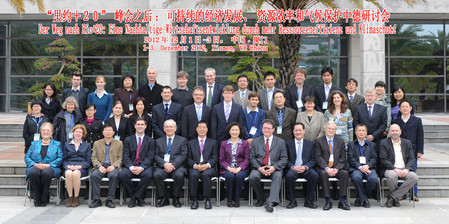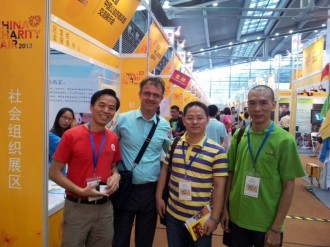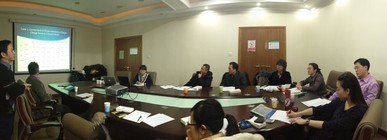
Xiamen University and the School of Public Affairs belong to the leading academic institutions in the South of China.
My Professorship at the School of Public Affairs, Xiamen University was supported by GIZ-CIM, www.giz.de and the state of Rheinland-Pfalz (Rhineland-Palatinate, www.rlp.de).
The purpose of the two-year professorship in Xiamen was to promote German-Chinese cooperation in the field of environmental and climate policies, including projects of non-governmental organisations.
Please find here an overview of dialogue, research and teaching activities.
Report on my activities as Resident Professor and International Cooperation Expert at Xiamen University
forschung-und-lehre_1-2013_kuhn[1].pdf
PDF-Dokument [180.2 KB]
Conferences and Workshops
Dt.-chin. Konferenzen in Xiamen 2. bis 4. Dezember 2012: "Der Weg nach Rio+20: Eine Nachhaltige Wirtschaftsentwicklung durch mehr Ressourceneffizienz" und "Klimaschutz und Nachhaltige Abfallentsorung nach Rio+20 im Kontext von Klimaschutzpolitik."
Presentations available at:
http://www.stoffstrom.org/veranstaltungen/veranstaltungsrueckblick/rueckblick-2012/xiamen-workshops-china/
Please find more articles and summaries of the conference at:
www.dandc.eu (Entwicklung und Zusammenarbeit, Development and Cooperation)
www.stoffstrom.org
www.kas.de/china/
Xiamen Konferenz Agenda Re...xlsx
Microsoft Excel-Dokument [16.2 KB]
Xiamen Konferenz Agenda Ab...xlsx
Microsoft Excel-Dokument [15.8 KB]
with Prof. Zhang Yangyong, next to me (middle) and NGO representatives, September 21, 2013 in Shenzhen
The National Charity Fair in Shenzhen is a major exhibition of NGO activities in China. It is sponsored by the Ministry of Civil Affairs. NGOs display their activities in different fields, dialogue and also compete for prestigious awards. Green Zhejiang under the leadership of Xin Hao won one of the prices for their amazing environmental, climate protection and pollution control activities in Hangzhou.
Research, international co-operation projects and teaching in 2012/2013
Environmental and climate protection governance and participation (R/P/T)
Civil society, NGOs and citizens' participation (R/P/T)
Development cooperation (P/T)
R = Research
P = Project Management/International Cooperation
T = Teaching
Research Project: Climate Change Awareness and Participation in China. Expert Survey
Time Frame: June 2012 to April 2013
Team Leader: Prof. Berthold Kuhn, Prof. Charles Zhang
Assistants: Chen Keru, Jia Xibei
Advisor: Prof. Zhijia Zhou, Kerstin Franzl (Nexus, Berlin)
supported by: Friedrich Ebert Foundation, Shanghai Office
Languages: English and Chinese
The purpose of this project was to conduct an expert survey on the level of awareness on climate change issues in China, the role of NGOs and citizens participation. The project also organised several dialogue events.
The expert survey consists of three categories of questions related to:
- Factors influencing awareness on climate change in Chinese society
- Role of Chinese NGOs in the field of climate protection
- Potentials and constraints of citizens' to contrinute to climate protection.
The interviews and questionnaires were analysed with qualitative as well as quantitaive research tools.
Presentation of the results at United Nations Environmental Program/Tongji University Shanghai Conference in June 2013
Status: Expert survey concluded (133 questionnaires, 40 interviews), report drafted, presentation, see Publicatons/Presentations.
Die Ergebnisse werden Ende 2013/Anfang 2014 im Journal of Current Chinese Affairs (GIGA, Hamburg) veröffentlicht.
Forschungsprojekt: Klimaschutzpolitik in Xiamen: Strukturen und Status quo.
Zeitrahmen:
Teamleitung: Prof. Dr. Zhijia Zhou
Beratung: Prof. Dr. Berthold Kuhn
Assistenz: Shi Min, Shen Yue
Zeitrahmen: April 2012 bis April 2013
gefoerdert durch: Konrad-Adenauer-Stiftung, Buero Schanghai
Sprachen: Chinesisch und Deutsch
Status: Abstract available at
http://www.stoffstrom.org/veranstaltungen/veranstaltungsrueckblick/rueckblick-2012/xiamen-workshops-china/
Dieses Forschungsprojekt befasste sich mit den Kompetenzen verschiedenen Akteure (Regierung, Verwaltung, NGOs), die in Xiamen zum Bereich Klimaschutz arbeiten. Ziel dieses Projekt war es, die Rolle, die Aufgaben und Projekte der verschiedenen Akteure in Xiamen im Bereich Klimaschutz zu beschrieben und zu analysieren.
Mit einer Dialogveranstaltung Anfang Dezember 2012, die im Kontext zweier Symposien in Xiamen stattfindet, wurde zu mehr Austausch und Zusammenarbeit, auch mit Akteuren aus Deutschland, beigetragen.
Course: NGOs in Theory and Practice, SPA/SPP, fall 2013 (in English)
KUHN Berthold ZHANG Yangyong Fall 2013.p[...]
PDF-Dokument [77.3 KB]
Course: Sustainability: International Cooperation and International Organisations, SPA/SPP, summer 2013 (in English)
Lehrveranstaltungen/Courses Xiamen University SPA/SPP 2012/2013 (in English)
State-Market-Civil Society Cooperation in Social Welfare and Environmental Protection, Spring/Summer 2013
This course analyses state-market-civil society cooperation from a theoretical and practical perspective. It focuses on comparative advantages and disadvantages of different kinds of institutions in addressing social and environmental concerns.
Good governance practices of cooperation and coproduction of services will be introduced. Simulation games will illustrate the potentials and dilemmas of interaction between different types of institutions. Students will deliver presentations based on case studies of state-market-civil society interaction from different countries and regions, including the P.R. China and Germany. The course further aims at familiarizing students with the relevance and meaning of key terms and concepts related to governance, participation, social welfare provision and environmental protection.
StateMarketCivilSociety summary ppt.pptx
Microsoft Power Point-Präsentation [130.1 KB]
Li Junlin, Yang Huishan
Social Enterprises in HK(final).pptx
Microsoft Power Point-Präsentation [5.2 MB]
Governance and Participation of Environmental Affairs and Climate Protection, Fall/Winter 2012/2013
This course provides an overview on environmental and climate protection policies, governance structures and participation at the international level and in selected countries and regions, including the P.R. China and Germany.
Students will learn about the significance of concepts and terms related to environmental and climate protection policies, including sustainable development, green growth, climate change mitigation and adpation.
The course will provide the students with analytical tools to understand key issues of international environmental and climate protection dialogue and learn about the role and contributions of different stakeholders, including governmental, transnational, non-governmental organisations and citizens.
International Development Cooperation, Summer 2012
This course will look at the historical evolution and the present challenges of international development cooperation across different regions and sectors.
Emphasis will be paid to environmental, health, education and good governance issues in international cooperation.
The course introduces the mandate resp. the mission, the agenda and the work of international organisations, development banks, development agencies governmental and non-governmental organisations.
The Structure of Civcil Society in Comparative Perspective ,Spring 2012
Course Outline: The structure of Civil Society
Professor Berthold Kuhn, spring term 2012
This course introduces the concept of civil society in theory and practice. It deals with the theoretical dimensions of civil society and provides an overview of the structure of civil society in different countries, regions and policy areas.
本课程从理论和实践方面介绍公民社会的概念。它将介绍和讨论公民社会的理论,并将提供不同国家、地区和政策不同领域的公民社会结构的概况。
The term civil society has received growing and widespread recognition in academics, by policy makers and in the practice of project management and international cooperation.
公民社会已经在学术界、政策制定者中得到越来越多的关注,在项目管理和国际合作的实践中得到重视。
Non-Governmental Organizations (NGOs) provide essential welfare services and contribute to raise public awareness and participation in education, health, and environmental protection. They have developed new concepts of rights, responsibilities and sustainable development.
非政府组织提供了基本的福利服务,致力于提高公众对教育,健康和环境保护的关注和参与。他们发展了新的权利、责任和可持续发展的概念。
This course analyses strengths and weaknesses, opportunities and constraints of different kind of civil society organization.
这门课程将分析以上活动的优缺点、机会和不同的公民社会组织的局限。
It looks at their networking structures and their cooperation with Government, international organizations, development agencies and the private sector across different countries and regions and at transnational level.
课程还将关注它们的网络结构以及它们在不同国家、地区和跨国家层面在与政府、国际组织、发展机构、私人部门的合作。
Students are supposed to contribute to this course by engaging in group work and presenting salient features of the structure and the activities of civil society in different countries and regions and at the level of international cooperation on global issues.
学生需要参加小组工作,针对不同国家和地区公民社会结构的重要特征和主要活动,并针对全球问题的国际合作进行课堂报告。
PDF-Dokument [211.3 KB]




